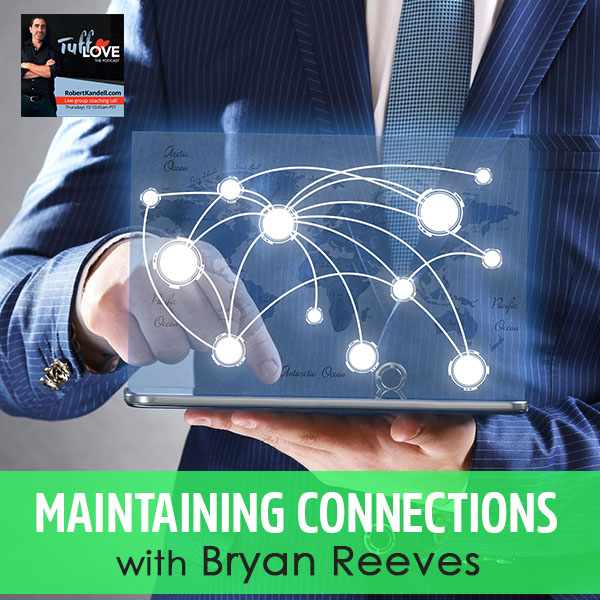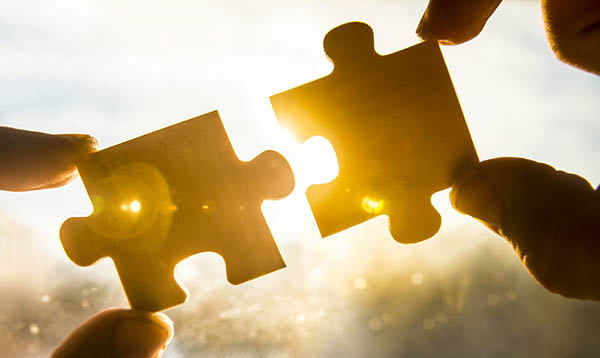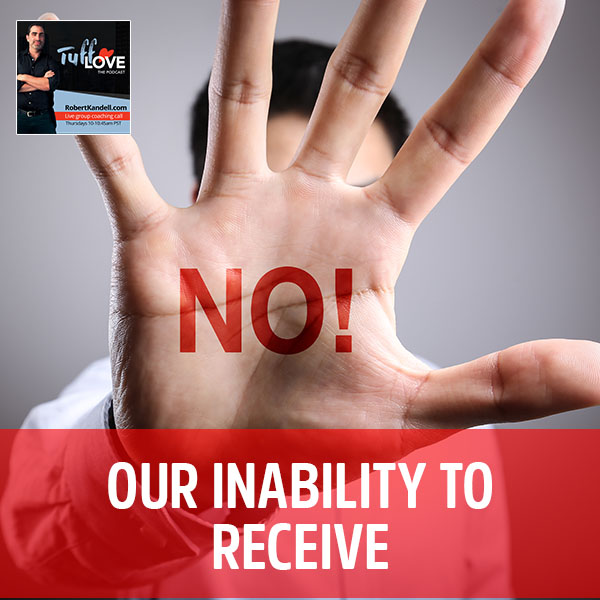
157: Maintaining Connections with Bryan Reeves
Sep 18, 2018
157: Maintaining Connections with Bryan Reeves
I’m with Bryan Reeves, who’s someone I’ve known mostly from a distance for a couple of years, and then in person for a couple and then distant again, and then we reconnected again. The best way I can say is I have a man-crush on Mr. Reeves. It’s just who he is in the world, his incredible writing style, and his reach. I’m happy to welcome you to the show, Bryan.
Thanks, Rob. It’s a pleasure to be here and likewise, I admire from close and then afar, and then close again and hopefully not too far again.
When women talk to each other, there’s a flow of intimacy, there’s a flow of appreciation. Woman to woman can talk about their clothing they admire and all the aspects of it. It doesn’t quite happen much with men. What’s your viewpoint on why men can’t say, “I like you, I dig you, your shoes are great, I have a man crush on you?” What’s the stop of that intimacy?
First off, I want to acknowledge Robert because I have an admiration for you and I appreciate you asking these questions because I know you could answer them. I want to acknowledge that. I feel very much a kinship with you. I’m excited for us to play with this. I know for me growing up on the East Coast, it’s not a very touchy-feely place. We’re at the heart of the culture of, “Men don’t feel, boys don’t cry, don’t be a girl, all that kind of stuff.” We get that indoctrination on and on and we’re hearing this message more and more. It’s no big surprise.
Interestingly, even just chemically in our bodies, what happens is the testosterone rushes, we get both as a fetus and when we enter into puberty. I was fascinated to learn that boy’s language changes when they’re right around the time of twelve to fourteen years old. The way that boys talk about friendships and their parents, they use a lot of words like love and it’s very affectionate. Then when we turn into teenagers, we stop and that language shifts dramatically and they were like, “He’s okay, he’s cool,” a lot of the affection comes out of our language. It’s reinforced by all the cultural stereotypes. That’s why we need to drink beer to say, “I love you, man.” It’s terrible.
This is new information. You’re saying there’s an actual biological change, which happens as testes, testosterone, facial hair, hair in other places that are embarrassing to young boys, our voice changes, muscle mass density. Are you saying it affects the language?
Testosterone blocks oxytocin. We’ll just keep it in very simple terms. Oxytocin is what we call the bonding hormone. It makes us feel connected to each other. We get that rush of testosterone when we enter puberty and all those things, facial hair, voice changes, sexual drive, a lot of things start to come online and with that comes a diminished capacity to feel. Then a lot of brain changes are going on. It’s cliché. Teenagehood is a very confusing time. Naturally, that’s going to affect how we speak into the world. Even our language becomes less affectionate, less loving, less tinged with connecting language.
My parents always said I got into the grunting stage. I was grunting.
It’s a real phenomenon and we don’t get any support. No one helps us through that stage in a way and we resist it anyway. Even if people do try to help us, we’ve lost that boyhood to manhood rituals that steward us through that transition in a powerful way. Instead, we’re lucky if our parents throw us the car keys and say, “Good luck out there, son. Don’t kill yourself. Wear a condom.” We get that direction but that’s it.
What’s evident to men is not evident in heterosexual context to their female partner. Click To TweetPain-based, fear-based, “You’re doing something wrong,” kind of thing.
No one stewards us through that in a powerful way so that we can integrate what’s beautiful about being a man and holistically speaking, taking on responsibility while also learning how to feel in the way that a man feels. We’re not taught any of that. We grunt our way through the next twenty years and probably mess up at least a dozen relationship experiences or certainly one. I remember a few years ago, one of my closest friends talked to me. He was having marriage challenges and he said, “My wife and I were sitting in our living room and we were having a conversation and we’re talking about our marriage. Things were going well and she just looks at me and she says, ‘I just don’t feel connected to you.’” He sits there, he looks around like, “We’re in the same room, we’re having a conversation, words are coming out of my mouth, words are coming out of your mouth, we’re here. I’m not on my phone, what are you talking about? What does that even mean I don’t feel connected to you? What does that even mean?”
I have a friend, Arielle Brown, she’s an amazing human being. He runs a group for women called Appetite and once a quarter, I get to go on the phone and do the guy thing with the women, which I love. This happened on Monday and I was exhausted but wired, that mix between coffee and brain dead. I wasn’t in the mood and so when they asked questions, they do this long introduction and it’s like, “How do you go deeper with a man? How do you tell a man you want to go deeper?” That goes on for another three or four minutes and I was like, “If I was a normal guy, I wouldn’t know what were you talking about. What does it mean to go deeper? It’s the same thing.” They laughed and it’s apparent, the chasm between some of these words and how women get mad at men for not understanding what’s evident to them. They project the simplicity of it and the guy is like, “I don’t know what you’re talking about. I was raised to grunt.”

unHIDDEN: A Book for Men And Those Confused by Them
It’s vice versa. We’re speaking in generalities here. What’s evident to us is not evident in the heterosexual context to our female partner. We all mean well, nobody wants to mess up relationships, not anyone that I’ve ever met anyway. No one wants to screw these things up and yet it seems we fall into these patterns constantly. In your book, UnHidden, I love the story that you told about how you had that first awakening where you went to that group up in northern California. Your wife at the time brought you there. I’m going to tell your story. Here’s what I got from it. You’re Mr. Businessman, Mr. San Francisco. I don’t remember what work you were doing, but it was like any guy would do. Your wife wanted to take you to this sexuality course, this weekend course. There was communication, I don’t know if there was the sexuality component to it.
You go there and everyone sits in a circle as we do in California. You’re sitting there and the teacher invites everyone to share and you go first. You’re thinking, “I’m going to nail this. I’ve got much goodness to share.” You’re talking for a few minutes and I think you talked for five minutes and then the teacher asked you, he looks at you and says, “Do you realize that your wife is crying right now?” You were oblivious to what was happening to your partner at that moment.
I love that. It’s such a great story. It’s a great way to start your book. I’m practiced, I’m aware. I know I have much insight and I do this work. I work with couples and yet my partner will say, “Do you know that I’ve been angry for the last hour?” “What? No.” Frequently, I didn’t realize what was happening to her. It’s one of those things that we’ve learned to laugh at, but yet until you recognize it, it’s there. Until you recognize it, it’s like we’re doing so much damage and we don’t even realize it.
Thank you for telling my story. That’s never happened in my entire life. The thing is that we are human beings. We’re evolving, we’re changing, we want to change, we want our partner to change, we want so much evolution. This eventually will go to the topic of the show about maintaining the connection, but in the evolution of our human dynamics, physically, emotionally, energetically, spiritually, we’re going to make mistakes. We’re going to miscue. What worked yesterday is not going to work today. She might get angry and you might be thinking about something else and not see it. In terms of maintaining intimacy and connection for men, how do you ensure that in the evolution and the dynamic of our life, how do we stay connected?
One of the things that I present in people’s minds when I’m working with them is that the tension that we experience, we’re always wanting to resolve tension, make the problem go away, make the tension go away, make these differences go away. I remember a number of years ago, I geeked out on a bunch of Netflix’s Mount Everest documentaries and I saw most of them were men who would accomplish everything else in their lives. It was like, “What’s the last thing that I can do that will be the pinnacle?” It’s climbing Mount Everest. What fascinated me is Mount Everest kills one in 40 people and that’s on the way up. That’s the easy route. I noticed that when they would climb that peak and they stand at the top, they will be interviewed.
Many of them said, “What am I going to do next? I’m going to climb it again but this time, I’m going to do it with less oxygen. I’m going to only use one Sherpa instead of three or I’m going to go on the route that kills one in twenty men instead of one in 40.” It occurred to me, it’s like in any relationship, it’s the same. You said something that I love, what works today won’t work tomorrow. If it did, we would get bored anyway and we’d want another challenge. One of the things that I try to present with couples is that resolving the tension is not where connection lives. In fact, often connection lives in learning to embrace that tension, learning to embrace those differences.
I remember in the first month that I was dating Silvy, I had a rough day one and I took her out to dinner. We had a date planned that night and I wasn’t feeling good. I was feeling funky in my body and I wasn’t feeling good but I didn’t hide it, I didn’t fake it. I allowed myself to be funky and we went out to dinner. We went to Sage Restaurant in Culver City and I was funky. I didn’t even like my own company, but I didn’t take it out on her. I didn’t take it out on the wait staff. I didn’t vomit all over the world. Later that night, she sent me a message that said, “I felt so connected to you tonight.”
What worked yesterday is not going to work today. Click To TweetI thought, “What? Really?” It didn’t make any sense because I didn’t even like my own company and yet here she was reflecting back, “I appreciated you feeling what you’re feeling.” It’s learning to feel what I’m feeling. This is an evolution in the process for me too. I was in the military. I was taught not to feel. When I say taught, we were all taught that, but the government invested millions of dollars training me to not feel. There have been times I remember Silvy and I had a breakdown and we fixed it and then we separated. She went to her home and she sent me a message that said, “I want you to know I care about your feelings.” My first thought was, “Why? I don’t even care about my feelings.”
One thing that she’s been great at reflecting back to me is that awareness that if I don’t care about my own feelings, I’m never going to care about hers. That is the key right there. It’s learning how to feel our own bodies. A lot of times you ask a guy, “How are you feeling?” He doesn’t know what you’re talking about. The last thing he wants to talk about is his feelings. Even if in a lot of us men, women too, we don’t even know what we feel. We know what we think, but yet a connection happens in just being present. What the hell does that mean? One of my teachers, Steve James, I’ve done some coaching with him and done some of his coursework, and he gave me a definition of intimacy that’s changed the way I understand intimacy. Intimacy is seeing what is there to be seen and feeling what is there to be felt.

Maintaining Connections: Connection happens in just being present.
That has been revolutionary for me in understanding intimacy and learning how to create a connection. I’m never going to feel the way Silvy feels, the way my partner feels. Our bodies are different. I’m not going to feel at the level and depth and consistency or variety that she feels and I wouldn’t want to. That’s her gift to me. I don’t want to become that in my own. I like how I am, but learning to feel what’s happening for me and not try to resolve it by usually getting her to change so I can feel better or feel something different or whatever, that is one of the most connecting practice that I’ve ever been practicing in my own intimacy. It’s feeling what I’m feeling and not projecting onto her like she has to do something about it.
There are seventeen different roads I want to take from that last dialogue. I’ll say my favorites of it. The first is we think, we’re trained and we believe that the facade is something we’ve got to work on, the hair, the face, every speck of clothing. We think the facade is what’s going to win the girl, get the guy or whatever gender. We think that’s it but here you are with the example of, “I’m funky, I don’t feel good, I don’t look good, I probably smell bad, I’m off casting my angst,” and then Silvy said, “I feel connected to you.” There’s someone laughing, there’s some ancestor laughing our asses off at each other like, “We spent so much time, but we want to feel each other.”
Silvy’s an extraordinary woman. She lives in Los Angeles, she’s gorgeous, she’s a catch. She told me when she was dating before, a lot of men would lead with their money, lead with their accomplishment, doing the peacocking thing and I get it. I’m a man, I understand status. It’s evolutionary, when we have status, we have more reproductive rights or reproductive freedom because we can provide, but that shit doesn’t care anymore. Women don’t need our resources the way they used to. Women want differently now. They want more emotional support. Esther Perel talks about how things have changed and relationships used to serve economic functions. Now they serve emotional function largely. Someone said that even the tax breaks you get from being married don’t matter that much anymore.
The economic change is significant and to tie in a lot of what we said so far, I’ve done a lot of research and this is in a book about what happened in the ‘60s and ‘70s. There are all these programs for girls to equate in terms of society with men, like The War Against the Boys, the classic books I tend to talk about, but there were no complimentary programs for men. When you were talking about the twelve to fourteen who were in love and then the testosterone, there’s no education to take, to have a guy or a boy understand that what’s happening for them and to learn these important social-emotional intelligence skills. Coming back to the topic, you have five challenges for men and intimacy. What challenges do you see in today’s world that are facing men to maintain and create intimacy?
We talked about a few of them. We don’t know what connection even means. That’s a big challenge, just language. What does that even mean? No one ever taught us how to do it. No one ever taught us how to connect. No one ever taught us how to do intimacy. We don’t have any idea what intimacy even means. It’s such an abstract term. It’s why I love Steve’s definition. It’s feeling what is there to be felt and seeing what is there to be seen.
In the evolution of our human dynamics—physically, emotionally, energetically, spiritually—we're going to make mistakes. Click To TweetDo you think women know that men don’t even know what that means? Is that a serious block in itself?
Absolutely, definitely. In the same way, it’s the war of the sexes. There isn’t a war of the sexes. There’s a misunderstanding of primal values of these primal differences. That’s why one of the maps I love working with is masculine and feminine intimacy, which doesn’t mean man woman, we have to do that disclaimer. I was working with a same-sex couple and I could see as I was going over these talking about this masculine, feminine, these primal differences, one of the partners started smiling. That’s the same thing, that masculine fear of being controlled. I call it the masculine objection, “Don’t tell me what to do.”
Women don’t understand that we genuinely don’t get it. We’re not joking, we’re not being difficult because we’re stubborn or lazy or something. We genuinely don’t understand, not just intellectually but even viscerally. It’s been conditioned out of us to feel. When I see this one, I work with couples, especially that women feel that disconnect viscerally and again that’s oxytocin. Oxytocin is unleashed in a woman’s body through conversation, through talking, through nice conversation, oxytocin gets released. It doesn’t happen that way for a male body. For male bodies, generally, it’s physical touch that releases oxytocin. We need to literally physically be touched. That’s why there’s even a lot of the stereotype that men just want sex. It’s not that men just want sex, it’s that we tend to require more physical contact to feel the connection. That’s why I can sit next to my partner for an hour and not know what she’s feeling and think everything’s okay because I’m okay, I’m fine. I don’t feel the disconnect that she’s feeling in that moment viscerally.
You are dropping some new information for me, which I’m grateful for, and hopefully to the audience as well. This is important stuff because we mentioned this, a woman will transmit something that she thinks is so clear and so evident and the guy’s like, “Hey,” and then she gets mad because it’s so clear and so evident.
It’s like, “What’s wrong with you? Why don’t you get it?” She’ll say, “I’m asking you for what I need. I’m telling you what I need.” He thinks he’s doing it and it’s still isn’t working. I remember early in my relationship with Silvy in the first month, I was traveling a lot. I was in New York, she was in LA. I was crazy about this woman. We talked every day but I’m in New York, three hours ahead. I didn’t want to call her and wake her up in the morning. I figured I’m going to get into my work and I’ll call her in the evening and everything’s fine.
After a few days of this, she told me, “I need to talk to you twice a day. I need to hear from you in the morning because it’s strange. I get to later in the day and haven’t heard from you. I don’t understand what’s happening. I’m feeling a little disoriented.” I remember thinking, “That’s cool. I thought everything’s fine. If you need something you can text me, you can call me,” but she doesn’t want to pursue me, which I totally appreciate. I realize the importance of that, so I said, “We’ll be in touch twice a day.” The next day I called her, it’s 11:00 AM and I’m into work already, “How are you doing? Do you have a good sleep? Is everything good? What did you do today? Okay, great. I’m off to work. Have a great day. I’ll talk to you later.”

Maintaining Connections: We address the level of the complaint but we miss the underlying emotional yearning for emotional literacy, emotional intelligence, and emotional connection that needs to be present.
You’ve knocked it off your to-do list. There’s a big check, “Call Silvy in the morning,” but something tells me this didn’t go over very well.
She hated it. It was worse than not doing it at all. That’s the thing, a lot of us don’t get it because we think we’re doing the thing she wants and it’s still not working because it’s not about it. I call it the level of the complaint. We address the level of the complaint but we miss underneath the underlying emotional yearning for emotional literacy, emotional intelligence, and emotional connection that needs to be present. I realized my tone of voice matters. It’s physiology, my body, and how I am being in my body and speaking in my business tone of voice. She feels it viscerally, it doesn’t release oxytocin for her. It’s like, “He’s a robot. He’s in his head,” and I see this a lot. I was working with a couple. The wife was saying how her husband has two personalities. There’s the above head husband and then there’s the below the neck husband. He doesn’t know what the hell she’s talking about.
I was talking about this in an interview with Elizabeth Dialto and the way I described it was men truly want the most results for the least amount of effort. She referred to Tim Ferriss, I might be butchering this, but it’s the minimal dose. You want to go on the phone and get that check-in and do what you know to please the woman, our version of pleasing the woman and it didn’t work at all.
Which then adds to our frustration when we don’t realize what’s happening because that’s the thing, men love solving problems. That’s why we invented sports and sports are nothing more than just made up problems that we get to solve. There’s a time limit, it’s 60 minutes and we know who solved the problem better at the end of 60 minutes. A relationship is a game that never ends. I shouldn’t say we never know who’s winning, but we always know we’re losing. That’s the problem. It’s a game we can’t win and it never ends. At some point, it’s like, “I want out, I don’t want to do this anymore because I feel like I’m constantly losing. I’m damned if I do, damned if I don’t.”
Without a connection means we don't know how to do it. Click To TweetWe’ve got the list, we know what a connection means, we don’t know how to do it. That was number two. Do you have three, four and five?
Three, four and five, we connect differently with men than we connect with women. Men and men connect very differently than women and women. I can’t remember where I learned this years ago and I’ve seen it play out in my own life, we connect shoulder to shoulder. Hunting through the forest, if you will. We connect at task accomplishment. We’re looking out to accomplish something together and that’s how we connect. It’s a dad and son in the garage learning how to put a car motor together or something, whereas women connect face-to-face. A lot of times men in relationships, we want to be left alone, “If you leave me alone, we’ll have a great relationship,” so the thinking goes, “Stop asking me to do things I don’t want to do and we’ll be fine,” but her need to connect face-to-face is what releases oxytocin.
It's the truth that we want to believe that will set us free. Click To TweetNavigating that challenge of learning that men can’t connect with our partners in the same way that we might connect with our friends. Number four, it’s similar but there’s masculine-feminine value clash. I learned this from David Deida’s work. My own understanding has evolved over the years, but it’s the masculine value of freedom versus the feminine value of connection. Heterosexually speaking, but generally speaking, it’s when your partner is yearning for connection but you’re over here arguing for freedom. We are so loyal to the truth. The truth will set you free and it’s not the truth that is, but it’s the truth that we want to believe that will set us free.
This one, the connection versus freedom, was a big issue for Morgan and myself and it was amazing to watch the evolution. Luckily, we had the skills to stay connected, but I was in a very intense situation for ten to twelve very long years. I fell in love with her pretty much from the onset and then I was still in love with my freedom. I was in love with her and I was in love with my freedom, I was in love with my freedom and I was in love with her. The rub was trying to find how to balance between the two. It’s very different, like you said, between masculine and feminine. A man’s need or love of being able to get on the road and do the things they do and have sex with women and be free and at the same time we want the connection as well, I love that.
I read one of your transcripts where it was just you speaking and you were sharing how we, men, do this so much. You were sharing how your core value being freedom, at least the primal value, that was your gift to your wife. Freedom, you’re free. I want my partner to be free. Even if I have to be uncomfortable with something, I want you to be free to do what you got to do. I will support you, I will love you, even if it makes me uncomfortable, I’ll figure it out. I don’t get that in return in the same way because there’s a different value that comes back in. That can again be very confusing for us because we think, “I’m giving you what I think will work for us because if you gave it to me, we’d be great.” Likewise, she’s giving me so much connection. If I use my hands, my hands are connected. They’re not independent of each other, but here they’re free. They seem at odds with each other. That can create real challenges and pain between two people in a relationship when they don’t understand that clash of values.
You’re coaching me and Morgan. You’re successfully talking at different levels because I was coaching a couple. I told them about our setup. My viewpoint is Morgan is totally free to do whatever she wants. Inside our monogamy with guest stars relationship, there are rules and containment. This is something that we happily, after many years, worked out. Then I said, “Morgan’s never used it.” She’s never used the card because she doesn’t care. It’s not what her desire. It’s my projection of what would make her happy and I feel happy not holding that that is true, but it’s hilarious to think about. It’s like, “Thanks for the card. Thanks for the TiVo. I don’t even watch TV.”
It’s funny because as I learned all of this and I learned it when I was single before I met Silvy so that when I came into the relationship, it doesn’t mean that challenges are still there. I was able to do things, for example, when we started dating and I still do it today, if she goes out with a friend and I knew she was going out for an evening, I would tell her, “Text me when you get home, let me know when you get home safe.” I would never have done that before because it felt like it’s so controlling. Who the hell am I? Am I that guy that wants to make sure his woman is in bed when she’s supposed to? However, I realized that was a great gift that I was giving to her.
Women don't need our resources the way they used to. Click To TweetI was telling her, claiming her, creating a connection, letting her know that I care about her safety, I care about it so much. Even maybe I am a little bit jealous and I want to make sure you’re not out too late, it was a gift to her. If she had done that in return for me, “Hell, no. You want me to text you when I get home? I’m not going to play that game. I might still do it of my own free will, but being asked to, not if you’re like a child.” Again, there are totally different values at play here.
Let’s go to number five. There’s a question I want you to answer from that.
Number five is simply that we don’t feel our bodies. Our challenge in creating connection and maintaining it is we can’t feel our own bodies and if we can’t feel our own bodies, we’re living out of our stories constantly and we don’t connect, certainly not in intimacy through our stories. Usually, our stories are different anyway. I call it the relationship death gap, because one of us is usually arguing for some logical story or to fix something or we’re stuck up here and the other partner is just speaking for connection. They’re speaking at a different level but usually, because we’ve all been taught to live in our stories, we’re talking about two different stories. For many years, I used to wonder how is it that women just get to make shit up in relationships all the time like when we’re in a fight?

Maintaining Connections: Our challenge in creating connection and maintaining it is we can’t feel our own bodies. If we can’t feel our own bodies, we’re living out of our stories constantly and we don’t connect.
I remember I dated one woman for five years and she always seemed like she was making shit up constantly to get me. What was happening though was I couldn’t feel my body. I was living through my stories and all that I wanted to happen was like with Silvy in that first month, I feel funky. Forget the story. Forget why I feel funky. It’s this person’s fault, it’s that person’s fault, it’s your fault, it’s your dad’s fault, whatever. It’s my bank account’s fault. No, I feel funky.
Silvy, to this day, she still feels me most when I’m not in work mode, right brain mode, when I’m relaxed more. She said that to me because I’m learning to take more time and enjoy and not work so much and create more space. I can feel my body more and more relaxed. It creates a connection. I don’t even know what’s happening but it doesn’t matter. If she feels it, we’re good. We don’t feel our bodies, that’s number five.
The question connected to that is what practice would you suggest when someone experiences fear of becoming more intimate and vulnerable because of past trauma that occasionally shows back up? What kind of practice do you suggest when someone feels the fear based on past trauma?
Trauma is a big one and when I say a big one, I mean it’s the kind of thing you can’t blow past and we do it. We try it often, especially in our culture of what Steve James calls spiritual Rambo, spiritual Ramboism. We get past your blocks, your limitations, don’t believe your thoughts, all of that. Trauma is something embedded in the body and it’s important to not blow past that, but learn how to create more tolerance at the edges of it. When I’m working with couples, I’m teaching them to manage each other’s nervous system. Notice what’s happening in your partner’s body because a lot of times if you’re not paying attention to what’s happening physically, then by the time you realize all is not well, you’re way beyond. You’ve blown up things where it’s hard to come back and settle down.
It's easy to be partners when things are great, but learning how to be partners into discomfort when fear arises is the challenge. Click To TweetPay attention to the body and when you notice that you’re starting to hit that, “We’re getting to that,” stop the conversations, stop the activity, whether if it’s a sexual activity or whatever. If it’s a conversation you’re trying to solve something or resolved something, stop. Come back, just stop, pause, breathe. I’m assuming you’re with another person when this is happening. I love intimate relationship work because it’s about being partners even in the discomfort. It’s easy to be partners when things are great, but it’s learning how to be partners into discomfort when fear arises. Acknowledge that fear is present, something I’m getting upset at, I’m starting to feel, if you’re the one that’s having a traumatic response, learning how to say, “I’m starting to get triggered.” Putting language to it, speaking it, “I’m starting to get triggered, something’s happening in my body,” whatever that is for you, that’s the signal to don’t go any further right now. If you go any further, trying to resolve the tension or get through it, you’re only likely to reactivate the trauma. You’re not going to solve anything from that place.
You can’t out-think the trauma, the trauma is in your body.
You’re developing tolerance, you back away from it. What that does is when your partner can work with you there, it builds trust, which creates safety. When you build that trust and safety, then you can go a little bit further next time. If you don’t have the trust and safety and trauma, it sees everything as a threat until proven otherwise. It doesn’t matter that your partner has the best of intentions. The trauma isn’t rational. Trauma is primal, so that’s a practice.
Women don't understand that men genuinely don't get it. Click To TweetSee the professionals. I’ve spent years with my somatic therapist working through trauma, PTSD, and it changed my life. I highly recommend it. We whipped through this interview. We succeeded though, we’ve got your five challenges in there through a feminine route. We mixed the masculine and the feminine. You’re at BryanReeves.com. You’re also on Facebook, @BryanReevesOfficial, and you have a 90-day couples’ program, which is outstanding that you do with the lovely Silvy.
We do, we offer it together. We’re excited. It’s called the Conflict to Connection 90-day couples coaching program and you can find out about it on our website. I love it because the Gottman Institute, if you’re in the relationship world at all, you know about the Gottmans, they discovered that by watching a couple, what happens in the first three minutes, they can predict with 95% accuracy whether that conversation is going to end positive or negative. If you can learn how to say the right things, use the right language, just a few interventions, three minutes can change the outcome of a conversation which can change the outcome of your entire relationship. That’s incredible. That’s what we aim to teach in the Conflict to Connection program is how to be masterful in those first three minutes so that you can repair. The disconnect happens all the time. It’s not realistic. We’re not going to just create connection and have it forever. We come in and out of it constantly, but learning how to create it quickly is life changing
I’m truly grateful for your friendship, grateful for your wisdom, grateful for everything you’ve taught me on this podcast. I’m grateful for that and looking forward to our next adventure.
Thanks, I appreciate you inviting me on. It’s an honor, Robert.
Thank you, Bryan, for an amazing show. I had a blast. I learned a lot. I said it a couple times, I’m like, “I didn’t know that. I didn’t think about that.” Hopefully, you’ve got as much from this episode as I did. If you’d like the show and want more, please visit RobertKandell.com. Take care of yourself. We’ll see you next week. Thanks so much. I love you, bye.
Resources mentioned:
- Bryan Reeves
- Appetite
- UnHidden
- Elizabeth Dialto – previous episode
- The War Against the Boys
- BryanReeves.com
- @BryanReevesOfficial on Facebook
About Bryan Reeves
 My personal mission is to serve the world through my books, articles, workshops, retreats and private coaching practice that all help to awaken men, illuminate women, and create truly thriving relationships.
My personal mission is to serve the world through my books, articles, workshops, retreats and private coaching practice that all help to awaken men, illuminate women, and create truly thriving relationships.
I’ve been a regular contributor to The Good Men Project, Elephant Journal, Thought Catalog, Raw Attraction, Sexy Conscious Awake, MeetMindful, and New York Minute Mag once profiled me as a “Bad Ass Man.”
You can find my two books, The Sex, Flirting, Dating, Hunting and Hoping Diet and Tell The Truth, Let The Peace Fall Where It May on Amazon.
Podcast: Play in new window | Download







